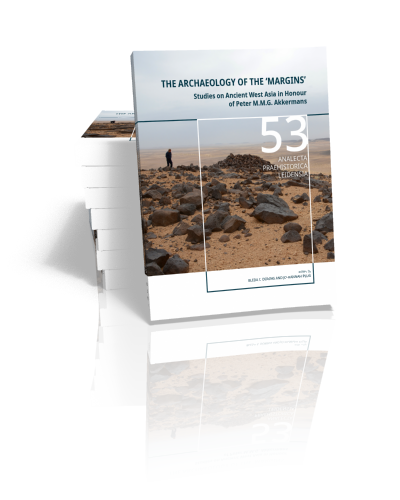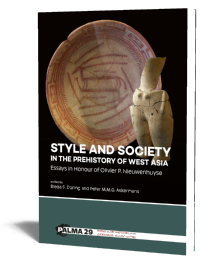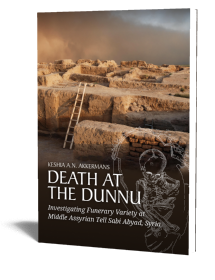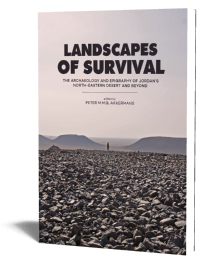The Archaeology of the ‘Margins’
Studies on Ancient West Asia in Honour of Peter M.M.G. Akkermans
Edited by Bleda S. Düring and Jo-Hannah Plug | 2024

The Archaeology of the ‘Margins’
Studies on Ancient West Asia in Honour of Peter M.M.G. Akkermans
Edited by Bleda S. Düring and Jo-Hannah Plug | 2024
Paperback ISBN: 9789464262919 | Hardback ISBN: 9789464262926 | Imprint: Sidestone Press | Format: 210x265mm | 310 pp. | Analecta Praehistorica Leidensia 53 | Series: Analecta | Language: English | 39 illus. (bw) | 85 illus. (fc) | Keywords: archaeology; West Asia; ‘marginality’; funerary practices; settlements; objects; iconography | download cover | DOI: 10.59641/h66998kt
Read online 373 times
- Digital & Online access
-
Buy via Sidestone (EU & UK)
-
Buy via our Distributors (WORLD)
For non-EU or UK destinations you can buy our books via our international distributors. Although prices may vary this will ensure speedy delivery and reduction in shipping costs or import tax. But you can also order with us directly via the module above.
UK international distributor
USA international distributor
-
Bookinfo
Paperback ISBN: 9789464262919 | Hardback ISBN: 9789464262926 | Imprint: Sidestone Press | Format: 210x265mm | 310 pp. | Analecta Praehistorica Leidensia 53 | Series: Analecta | Language: English | 39 illus. (bw) | 85 illus. (fc) | Keywords: archaeology; West Asia; ‘marginality’; funerary practices; settlements; objects; iconography | download cover | DOI: 10.59641/h66998kt
Read online 373 times

We will plant a tree for each order containing a paperback or hardback book via OneTreePlanted.org.
This book is a tribute to the remarkable achievements of Peter M.M.G. Akkermans in the archaeology of West Asia. A focus on previously overlooked periods and regions has been the hallmark of his work. Instead of investigating the traditional key transitions and core regions that have been central to the archaeology of West Asia, Peter always aimed to shed light on the ‘in-between’ periods and regions, often dismissed as being ‘marginal’ (in his words ‘marginal to whom or what?’). Through his long-term, systematic research in the ‘backwaters’ of the Balikh and the Badia, Peter demonstrated that these supposedly ‘marginal’ places and periods have, in fact, very rich and complex archaeological histories and are of key importance for understanding West Asia’s past and present.
Throughout his long career Peter has collaborated with and inspired many researchers, and he has mentored generations of upcoming archaeologists. Here, a selection of his former students and colleagues present a series of studies on societies and periods at the margins of research in West Asia. The contributions, written by an international group of authors, are organised in three broad themes that have also featured in Peter’s career: ‘death and society’, ‘settlements and society’, and ‘images, objects, and society’. We are convinced that colleagues working on West Asian archaeology who have appreciated the work of Peter M.M.G. Akkermans will find much of interest in this volume.
Archaeology in the Backwater: Peter Akkermans in the Balikh and the Badia
H. Huigens and K. Duistermaat
Bibliography of Peter M.M.G. Akkermans
Compiled by H. Huigens
I. Death And Society
Cause and Manner of Death at Late Neolithic Tell Sabi Abyad: A Forensic Discussion
E. Smits
Between Life and Death: Continuing Bonds at Late Neolithic Tell Sabi Abyad, Syria
K. Croucher and J.-H. Plug
The Syrian Excavations at Amrith VIII – The Tombs Excavated in 1954
M. Al-Maqdissi and Eva Ishaq
And The Flames Went Higher: A Study of a Late Bronze Age Pyre-Pit Grave from Tell Sabi Abyad, Syria
Keshia A.N. Akkermans
On Ends and New Beginnings: Monumentality and Changing Funerary Landscapes in Palmyra (3rd – 8th century CE)
Lidewijde de Jong
II. Settlement and Society
The 9th Millennium BCE in the Northwestern Badia of Jordan: Wadi Jilat 7 and Mushash 163
K. Bartl
Defining the Boundaries: Radiocarbon Dating Late Neolithic Tell Sabi Abyad
J. van der Plicht and J.-H. Plug
Developments in Food Storage at Late Seventh Millennium BCE Tell Sabi Abyad, Syria: Buildings with Suspended Floors
M.L. Brüning
Round Versus Rectangular. Some Thoughts on the Interpretation of Early Houses.
D.J.W. Meijer
Where There’s Smoke, There’s… Ritual? Interpreting Burnt Buildings of the Cypriot Chalcolithic
V. Klinkenberg
Shifting Societies in Chalcolithic Cyprus
B.S. Düring
Workers of Assyria Unite! Building the Walls of Dur-Šarrukēn
A. Politopoulos
III. Images, Objects, and Society
Dividing the World, Directing the Mind: Boundaries, Art and Ritual at Göbekli Tepe
M. Verhoeven
Figurines in Transition. Changes in Figurine Practices at Tell Sabi Abyad from the Initial Pottery Neolithic to the Transitional Phase (ca. 7000 – 5900 BCE)
M. Arntz
Hidden Hunters: Hunting Scenes as Micro-Landscapes in Black Desert Rock Art
N.Ø. Brusgaard
T-Scraper or an ‘Eccentric Bucranium’? Interpretations of an Enigmatic Artefact from the Ruwayshid Flint Mines in North-East-Jordan
B. Müller-Neuhof
Experiencing Gypsum Plaster
B. Nilhamn and S. Kume
Stirring the Spirit: Magical Treasure Hunting and Europeans in West Asia (ca. 1800-1930 CE)
K. Berghuijs
Dr. Jo-Hannah Plug
Jo-Hannah Plug is a postdoctoral research associate at the University of Liverpool, Department of Archaeology, Classics, and Egyptology. Within her current Leverhulmefunded postdoc she uses a combination of ancient DNA, stable isotopes, and archaeological evidence to explore the organization of PPNA to PN communities in the northern and southern Levant. Previously, her doctoral research focused on the mortuary record of Late Neolithic Tell Sabi Abyad, Syria.
Prof. dr. Bleda S. Düring
Bleda S. Düring, Leiden University (The Netherlands), Faculty of Archaeology. Bleda’s research includes the archaeology of early social complexity and early imperialism in West Asia. He is currently directing field work in Cyprus: at Chlorakas-Palloures and in Oman: the Wadi Jizzi Archaeological Project.
Abstract:
This book is a tribute to the remarkable achievements of Peter M.M.G. Akkermans in the archaeology of West Asia. A focus on previously overlooked periods and regions has been the hallmark of his work. Instead of investigating the traditional key transitions and core regions that have been central to the archaeology of West Asia, Peter always aimed to shed light on the ‘in-between’ periods and regions, often dismissed as being ‘marginal’ (in his words ‘marginal to whom or what?’). Through his long-term, systematic research in the ‘backwaters’ of the Balikh and the Badia, Peter demonstrated that these supposedly ‘marginal’ places and periods have, in fact, very rich and complex archaeological histories and are of key importance for understanding West Asia’s past and present.
Throughout his long career Peter has collaborated with and inspired many researchers, and he has mentored generations of upcoming archaeologists. Here, a selection of his former students and colleagues present a series of studies on societies and periods at the margins of research in West Asia. The contributions, written by an international group of authors, are organised in three broad themes that have also featured in Peter’s career: ‘death and society’, ‘settlements and society’, and ‘images, objects, and society’. We are convinced that colleagues working on West Asian archaeology who have appreciated the work of Peter M.M.G. Akkermans will find much of interest in this volume.
Contents
Archaeology in the Backwater: Peter Akkermans in the Balikh and the Badia
H. Huigens and K. Duistermaat
Bibliography of Peter M.M.G. Akkermans
Compiled by H. Huigens
I. Death And Society
Cause and Manner of Death at Late Neolithic Tell Sabi Abyad: A Forensic Discussion
E. Smits
Between Life and Death: Continuing Bonds at Late Neolithic Tell Sabi Abyad, Syria
K. Croucher and J.-H. Plug
The Syrian Excavations at Amrith VIII – The Tombs Excavated in 1954
M. Al-Maqdissi and Eva Ishaq
And The Flames Went Higher: A Study of a Late Bronze Age Pyre-Pit Grave from Tell Sabi Abyad, Syria
Keshia A.N. Akkermans
On Ends and New Beginnings: Monumentality and Changing Funerary Landscapes in Palmyra (3rd – 8th century CE)
Lidewijde de Jong
II. Settlement and Society
The 9th Millennium BCE in the Northwestern Badia of Jordan: Wadi Jilat 7 and Mushash 163
K. Bartl
Defining the Boundaries: Radiocarbon Dating Late Neolithic Tell Sabi Abyad
J. van der Plicht and J.-H. Plug
Developments in Food Storage at Late Seventh Millennium BCE Tell Sabi Abyad, Syria: Buildings with Suspended Floors
M.L. Brüning
Round Versus Rectangular. Some Thoughts on the Interpretation of Early Houses.
D.J.W. Meijer
Where There’s Smoke, There’s… Ritual? Interpreting Burnt Buildings of the Cypriot Chalcolithic
V. Klinkenberg
Shifting Societies in Chalcolithic Cyprus
B.S. Düring
Workers of Assyria Unite! Building the Walls of Dur-Šarrukēn
A. Politopoulos
III. Images, Objects, and Society
Dividing the World, Directing the Mind: Boundaries, Art and Ritual at Göbekli Tepe
M. Verhoeven
Figurines in Transition. Changes in Figurine Practices at Tell Sabi Abyad from the Initial Pottery Neolithic to the Transitional Phase (ca. 7000 – 5900 BCE)
M. Arntz
Hidden Hunters: Hunting Scenes as Micro-Landscapes in Black Desert Rock Art
N.Ø. Brusgaard
T-Scraper or an ‘Eccentric Bucranium’? Interpretations of an Enigmatic Artefact from the Ruwayshid Flint Mines in North-East-Jordan
B. Müller-Neuhof
Experiencing Gypsum Plaster
B. Nilhamn and S. Kume
Stirring the Spirit: Magical Treasure Hunting and Europeans in West Asia (ca. 1800-1930 CE)
K. Berghuijs
Dr. Jo-Hannah Plug
Jo-Hannah Plug is a postdoctoral research associate at the University of Liverpool, Department of Archaeology, Classics, and Egyptology. Within her current Leverhulmefunded postdoc she uses a combination of ancient DNA, stable isotopes, and archaeological evidence to explore the organization of PPNA to PN communities in the northern and southern Levant. Previously, her doctoral research focused on the mortuary record of Late Neolithic Tell Sabi Abyad, Syria.
Prof. dr. Bleda S. Düring
Bleda S. Düring, Leiden University (The Netherlands), Faculty of Archaeology. Bleda’s research includes the archaeology of early social complexity and early imperialism in West Asia. He is currently directing field work in Cyprus: at Chlorakas-Palloures and in Oman: the Wadi Jizzi Archaeological Project.
- Digital & Online access
-
Buy via Sidestone (EU & UK)
-
Buy via our Distributors (WORLD)
For non-EU or UK destinations you can buy our books via our international distributors. Although prices may vary this will ensure speedy delivery and reduction in shipping costs or import tax. But you can also order with us directly via the module above.
UK international distributor
USA international distributor
- Browse all books by subject
-
Search all books

We will plant a tree for each order containing a paperback or hardback book via OneTreePlanted.org.
You might also like:
© 2025 Sidestone Press KvK nr. 28114891 Privacy policy Sidestone Newsletter Terms and Conditions (Dutch)








